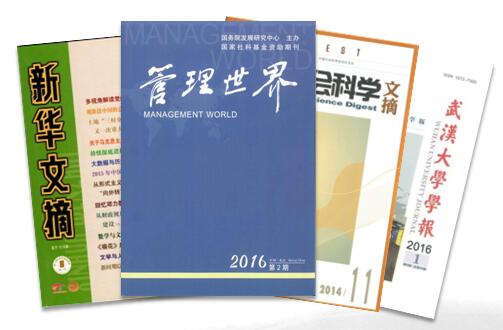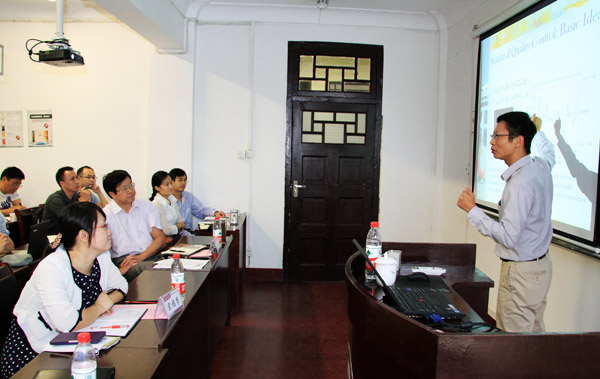For 5 doctoral candidates admitted in the first session, the award ratio of the full-time doctors is up to 100%, including 2 doctors gaining the first prize of the university academic innovation and 1 doctor gaining the second prize. The doctors at school had published 14 papers of CSSCI or above, and gained 5 instructions from the provincial leaders or above.
Institute of Quality Development Strategy has gained satisfactory results from beginning to admit the doctoral students to this day only for four years. Under the tutor’s guidance of Professor Hong Cheng, some master degree candidates who entered school for more than one year had published 9 papers in the domestic core journals such as Chinese Journal of Management, Journal of Wuhan University, and Journal of Zhongnan University of Economics and Law. The master student Cheng Zhang of Grade 2015 entering school only for half a year had finished Influence of Inner-enterprise Wage Gap on Product Quality – Based on Data Analysis of Chinese Enterprise – Staff Matching, which had been officially employed by Issue 5 of Research on Economic and Management of 2016.

Wuhan University Institute of Quality Development Strategy, established in 2007, was positioned as an interdisciplinary research institute integrating the scientific research, consultation service and talent training at the beginning of construction. It started to admit the full-time doctoral candidates in 2012, and started to admit the master degree candidates in 2014. It has cultivated 11 doctoral students including 9 doctoral students in school, and 23 master students in school up to now.
While investigating the development experience of the institute thoroughly, it is not difficult to find that, always persisting in the world-class postgraduate cultivation mode was the constant concept for the talent cultivation of the institute. The cultivation mode has several "secrets", such as open type cultivation of multiple tutors, problem-oriented academic ability cultivation, and "high motivation and strict requirement" policy environment.

The postgraduate education has commonly implemented the single tutor system cultivation mode for a long term. However, the factors involving limited vigor of the tutor and relatively single knowledge structure seriously restricted the innovation abilities of the postgraduates. Institute of Quality Development Strategy took the lead in exploring the cultivation mode of multiple tutors, and broke the barriers of the single tutor, to enable students to sufficiently share and absorb the resources of the academic team.
In addition, the institute widely employed the teachers from the world famous universities involving Toulouse University, Duke University, Georg-August-University of Goettingen, Waseda University, The Chinese University of Hong Kong, and Hong Kong University of Science and Technology, as the part-time professors. English teaching has been normal. The research team was built in virtue of "external brains".

At present, the rate of paying a visit abroad by the students of the institute is up to 83%. The doctoral student Yun Liu participated in American Economic Association annual meeting and the academic exchange meeting of Duke University, knew the research results of the discipline authoritative professors, discussed the topics of the paper with the world level masters, and experienced the impact of ideas.
Such multi-tutor system guidance mode combining the internal and external institutes and international and domestic broke through the “portal” concept of the tutor, and gave full play to the disciplinary advantages of each tutor and the supplementary effect of different professional backgrounds and academic levels, to enable students to enjoy the resources of multiple tutors as much as possible, expand the scope of knowledge greatly, widen the academic vision, and consolidate the quality of postgraduate cultivation.
The problem-oriented empirical research method is the most scientific research method internationally recognized at present, as well as the method obeyed by Institute of Quality Development Strategy for a long term. In the academic forum once every two weeks, the foreign well-known scholars and experts has been present frequently, to share the cutting-edge topics and problem perspectives with the students.
The institute guided the academic research with the concept of "discovering the real problems and solving the real problems". The important method of realizing the goal was to obtain a large number of primary materials. In the summer of 2014, all postgraduates made the quality observation and survey across the country, and carried out the investigation and writing of Chinese Quality Development Observation Report of 2014. In the summer of 2015, all postgraduates carried out the survey of the enterprise transformation and upgrading for one month in more than 570 enterprises of 14 cities of Guangdong, understood the quality development problems of the enterprises at the frontline deeply, and acquired the first data of the enterprise – labor force matching survey of China.

"Think like a scientist, and work like a migrant worker." All teachers and students of the institute have been familiar with such word, and internalized into the heart and externalized into the form.
The top-ranking scientific research output certainly needed good policy environment. In addition to the school financial assistance and scholarship system such as academic scholarship, national scholarship and academic innovation award, the institute actively explored the channel of the scholarship donation, to provide good external conditions for study and living of the postgraduates. With the high motivation, the institute strictly controlled the paper publishing and code of conduct of the postgraduates.
The master degree candidates should publish at least 1 paper in CSSCI, and publish at least 1 paper as an independent author in Journal of Macro-Quality Research. The doctoral candidates should publish at least 2 papers in CSSCI, SSCI, AHCI and SCI, including publishing at least 1 paper in the periodical directory of the university social sciences award, publish 1 international academic paper identified by this major, and publish at least 1 paper as an independent author in Journal of Macro-Quality Research.
The institute would also hold the postgraduate speech contest, writing contest and other skills competitions irregularly, to provide the self-display platform for students, and also make the students continuously sharpen themselves and promote ability of expression and professional skills.